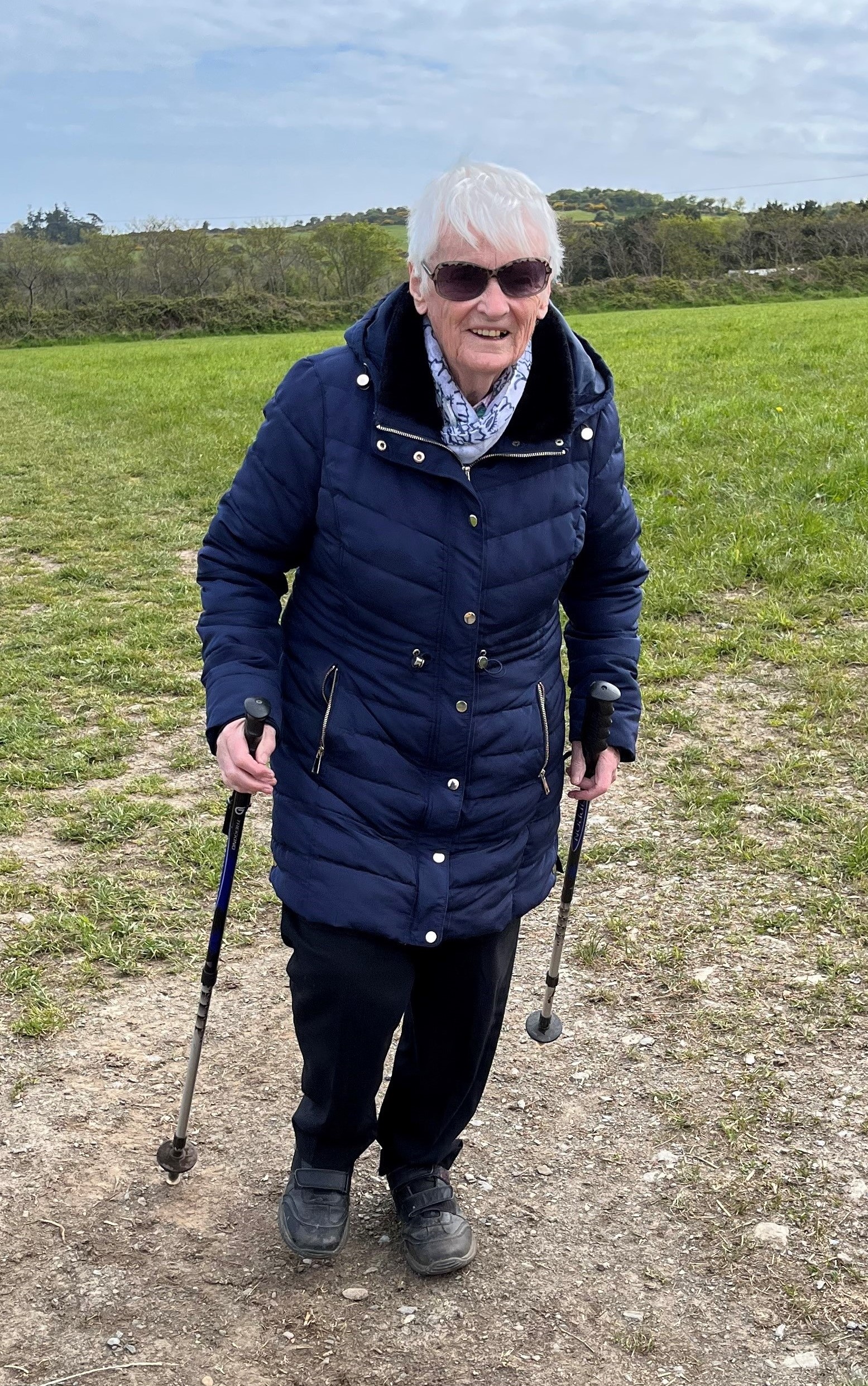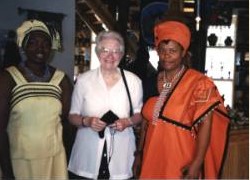
Meet the Founders 1: Sr Julie Newman
An organic farm, a farm shop, and an ecology centre by definition are things which seek to promote a deeper understanding of our relationship to the natural world. While striving to respond positively to our environmental problems, a sense of contact with the natural world is key.
In our own way we at An Tairseach are a significant part of the global shift towards a more sustainable, biodiverse and community focussed world. If that indeed is where we are going, then a sense of authentic contact with the natural world is where we are coming from.
Sr Julie Newman, one of the founders of An Tairseach, is a force of nature in her own right.
Though she is retired, her understanding of nature, her passion for agriculture and biodiversity, and her lifelong commitment to the creation and preservation of habitats on the An Tairseach farm, remain an inspiration for our daily work and for our future plans.
This year we have begun to explore our roots. We’ve begun to create an archive of interviews with the Dominican founders of An Tairseach.
We see this as an exciting way to preserve the story of how Wicklow Town, unlike any other place in Ireland, came to have seventy acres of organic farmland at its heart, a source of the healthiest in season food, a haven for wildlife that enhances gardens across the town, and a local and international gathering place for people seeking to explore and respond to environmental questions.
Behind the scenes the An Tairseach archive project has already become a repository of fascinating social history, candid accounts of the intersection of religious and environmental commitment, wise and far-reaching reflections on sustainable farming, ecology and the challenge for humanity as the environmental crisis deepens.
One of our archive staff recently walked the farm with Sr Julie, and reported back that her knowledge and her enthusiasm were infectious. Through her eyes every field and hedgerow is familiar, and every feature of the farm has a function and a story.
The An Tairseach farm is a place that she knows well, and partly because she has very deep roots here herself. A native of County Meath, she came to the Dominican Convent in Wicklow as a young broader in the 1950s. At nineteen she entered the Dominican Order, and spent three years at the novitiate in Kerdiffstown, which also had a farm. She trained as a Froebel teacher, and taught for some years in the Dominican Junior School in Eccles Street in Dublin; after which she completed an Arts degree and a H.Dip at Maynooth University, before returning to the Dominican Convent in Wicklow to teach English and Geography. Ten years later she was appointed Principal of the school, a role she fulfilled with enthusiasm for a further decade, before turning her attention in the 1990s to the establishment of the organic farm, farm shop and ecology centre that remain today a vibrant hub of sustainable food production and environmental action, with a wealth of stories and characters attached to it.
To stand in her company at the edge of the farm on a bright Spring morning, with the broad organic fields rolling down to the Irish Sea, the Murrough Wetlands SAC extending to the north, and the red-brick grandeur of the convent itself like postcard features, is to have a chance to recognise the growth of the town in recent decades. This changing place has been Julie’s home and her working environment for most of her life.
An Tairseach is an extraordinary legacy, and we are proud to acknowledge the vision of our founders. But there’s no time for proud reflections on the farm.
The archive recording we’re looking forward to sharing with you is an immersive podcast experience, loud with birds and full of a spirited and familiar observation of the land.
True to her own nature Julie makes her way energetically down the lane, through one meadow and into another. She’s keen to visit the groves of 12000 trees whose planting she planned and oversaw. And keen to see if there are onions or potatoes being planted in one particular secluded field, which is flanked on one side by a tall crop of glossy green leeks.
A mature shelter belt she tells us is composed entirely of alder trees, the cones from which are favoured by yellow siskins. The stands of Scots Pine nearby attract the siskins.
She marvels at the beauty of the wildflowers as she goes, greeting the springtime like an old friend.
The stems of the anemones are herb-like. The bluebells are uncommonly bright. The tadpoles are gone, but the marsh marigolds are coming soon. A drifting sparrowhawk overhead might be, at first guess, a kite.
Our problems require an intense political will and intense social change. But one wonders if there can be a sustainable future without respect and love of this kind in our lives?

Meet the Founders 2: Sr Marian O’Sullivan
‘We stayed with the name An Tairseach because it’s so meaningful. The way we understand is that we here are crossing a threshold from one world view to another. And we have to cross the threshold. And that takes courage. It takes a deliberate decision. We’re a threshold community here that invites people to take that step.’
Sr Marian O’Sullivan grew up on a farm in County Cork. She joined the Dominican Order in 1949, and spent most of her working life in South Africa, as a teacher and in variety of leadership position. She returned to Ireland in 1986, and was elected Prioress General of the Dominican Congregation that same year. After twelve years in that role, she made a commitment to the fledgling An Tairseach project, collaborating closely with Sr Julie Newman, and in 1998 she completed an MA in Ecology at Berkeley University in California.
A linguist by training, and a student of numerous languages (‘In my first year at Stellenbosch University, I had English, Afrikaans, Zulu, French and Latin’), Marian’s articulacy, her writing talent and her skill as a teacher, were central to the establishment and running of An Tairseach for many years. She was chair of the An Tairseach Board from 2002 to 2017, and director of the Ecology Centre from its first opening in 2005 until 2012.
In her archive interviews, Sr Marian speaks warmly of her upbringing in Cork, and explains that her vocation was a matter of personal certainty from a very early age. Asked about her love of the natural world, she explains that growing up on a farm on the banks of the River Lee made the sense of connection part of who she was. Her early experiences later fed her curiosity about the Celtic traditions, and influenced her study of ecology. She speaks about the deeper understanding that motivated her in the founding of An Tairseach, and in her subsequent leadership roles. Conservation, organic farming, the farm shop, and the ecology centre itself are all linked, she explains, to the core educational ambitions of An Tairseach.
For Sr Marian, the idea of personal transformation is central. In order to sustain any hope of environmental renewal, a fundamental change of ‘mentality’ is required. From the perspective of the founders, all who visit An Tairseach are invited to reconsider their relationship to the natural world.
As she says: ‘We are, hopefully, a threshold community here, that invites people to take that step from one worldview, where only humanity matters, to another where we are participants in this one community of life.’
To hear Sr Marian speaking, in an excerpt from the An Tairseach archives, click the audio below:
Music by Alannah Thornburgh

